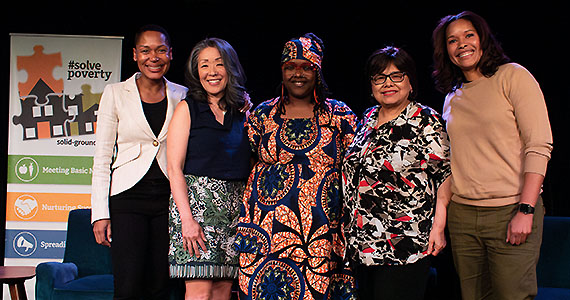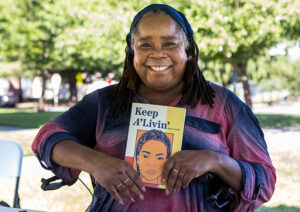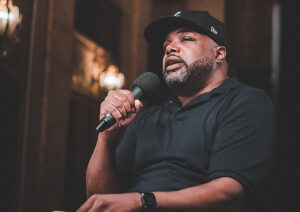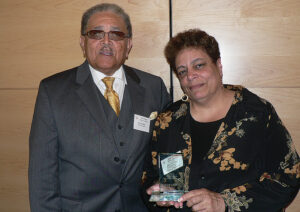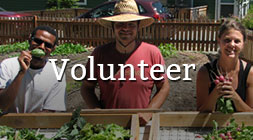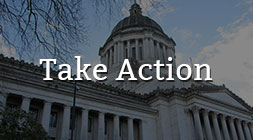Our Commitment to Undoing Racism
Over half of the people Solid Ground serves are people of color. Many face challenges as a direct result of institutional racism: housing discrimination, benefits denial, predatory lending, employment barriers, and disparities in the education and criminal justice systems. Simply put: We can’t be an effective anti-poverty organization without tackling racism!
Racism & Intersectionality
Our work to undo oppressions starts with racism, because throughout our country’s history, Black, Indigenous, and other People of Color (BIPOC) have experienced a different United States than that of white dominant culture.
Still, our approach is intersectional. We look at the impacts of all forms of oppression, including but not limited to sexism, ableism, genderism, homophobia, and others. We acknowledge and respect that everyone has multiple social identities, which complicate, inform, and often compound each individual’s experience of poverty.
BACK TO TOP
What We’re Doing About It
Solid Ground’s Anti-Racism Initiative (ARI) launched in 2001. Through the ARI, we identify conditions that lead to inequities and work to undo them – both internally at Solid Ground and in the broader community. Together we identify, learn about, and connect the policies and systems that perpetuate poverty and racism to the lives of our program participants and in our day-to-day work. Here are some of the ways we use an anti-racism lens agencywide:
- Anti-racism workshops, work groups, caucuses, affinity groups, and individual goal setting support staff to do this work.
- We listen to and honor input from people we serve. We believe in and trust their experience. Our Community Accountability Council, Community Needs Assessment, and Statewide Poverty Action Network Listening Sessions all create opportunities for us to hear from and respond to people most impacted by racism and poverty in our community. And the trifold structure of our Board of Directors gives people with lived experience with poverty and oppression decision-making power in the organization.
- Solid Ground’s hiring panels all have racial/ethnic diversity and include both management and frontline staff. We ask potential candidates values-based questions about poverty and racism during their interviews, such as “What are the root causes of poverty?”
- Our advocacy work focuses on removing service systems and policy barriers that people of color and low-income communities face. We support people to share their experiences with those in power to advocate for equitable policies.
Community Collaborations
No one organization can end poverty or undo racism and other oppressions on its own. We develop strong collaborations with individuals, partner agencies, and coalitions to build movements that make our community stronger for everyone.
We join with NPARC (Non-Profit Anti-Racism Coalition), the City of Seattle’s Race and Social Justice Initiative (RSJI), King County Equity & Social Justice, the Puget Sound Regional Council’s Planning for Equity network, the Social Justice Film Festival, Seattle Arts & Lectures, and others to do and promote anti-racism work.
BACK TO TOP
Land & Labor Acknowledgements
Solid Ground operates on land that has always belonged to the Coast Salish and Duwamish (Dkhw Duw’Absh) peoples. As a modern nonprofit, we’re part of a colonialist system that stole their land, attempted genocide, and continues to oppress Indigenous peoples. And like most modern-day U.S. institutions, Solid Ground benefits from the unaddressed legacy of stolen labor at the foundation of this nation and its vast and inequitable wealth. Read our Land and Labor Acknowledgements for more information and resources on how we acknowledge and address these impacts.
BACK TO TOP
Resources for Deeper Learning 
People often ask us what they can do to get involved in making change – so we created this Undoing Racism Brochure to provide some resources and suggestions. And below, you’ll find lists of resources compiled by Solid Ground Anti-Racism Initiative Steering Committee members to help you do a deeper dive into understanding our country’s oppressive labor history and present-day impacts, as well as local and national Indigenous-led organizations to learn more about.
Labor Learning Resources
Chinese Railroad Workers
Forced Labor
Japanese Internment
Migrant Workers
Native American Labor
Prison Labor
Reparations
Indigenous-led Organizations
- American Indian Health Commission of Washington state
- Chief Seattle Club
- Community Support and Justice: Indigenous/First Nations People (Seattle Central College)
- Daybreak Star Indian Cultural Center
- Duwamish Tribe
- Governor’s Office of Indian Affairs
- HistoryLink.org (Washington state history)
- Muckleshoot Indian Tribe
- Na’ah Illahee Fund
- National Inquiry into Missing and Murdered Indigenous Women and Girls
- Native Community Crisis Response Fund
- Northwest Indian Housing Association
- Real Rent Duwamish
- Seattle Indian Center
- Seattle Indian Health Board
- United Indians of All Tribes
- Washington State Missing and Murdered Indigenous Women and People Task Force
- Washington State Native American Coalition Against Domestic Violence and Sexual Assault
